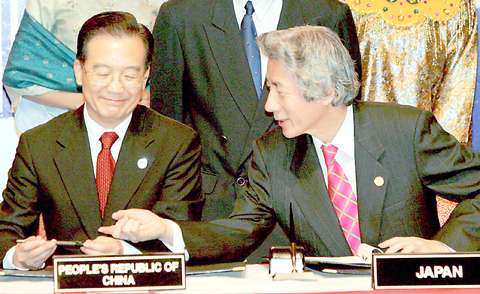Where frosty relations between China and Japan are concerned, the pen is mightier than the sword.
Chinese Premier Wen Jiabao (溫家寶) appeared to make clear his continuing displeasure with Japanese Prime Minister Junichiro Koizumi when he ignored Koizumi's request to borrow his pen at a signing ceremony yesterday at the East Asia Summit in Malaysia.
Wen had already refused to formally meet one-on-one with Koizumi at the summit amid a feud over the Japanese leader's visits to a shrine honoring war dead, including those executed for war crimes committed in China and elsewhere.

PHOTO: EPA
As leaders of the newly inaugurated East Asia Summit were signing a declaration on the group's establishment, Koizumi, seated next to Wen, leaned over and asked to borrow his pen.
Wen ignored him for several seconds until Malaysian Prime Minister Abdullah Ahmad Badawi, smiling broadly, intervened to repeat the request.
Wen then passed the pen to Koizumi with a smile, but the incident was widely noted amid an otherwise uneventful ceremony that concluded the 16-nation summit's formal business.
The snub came just a day after Koizumi said that he failed to understand why Wen had allowed the disagreement to spoil their meeting.
"No two nations are without their share of differences. I cannot understand why China won't have a meeting because of one problem," Koizumi said.
Wen on Monday had said Koizumi was fully responsible for the freeze in high-level contacts because his five visits to Tokyo's Yasukuni shrine while serving as prime minister had "deeply hurt the feelings of the Chinese people."
Wen has ignored most of Koizumi's attempts at affability during the summit's group photos and other public events, although the men did banter about seafood during a luncheon on Monday.
Addressing a news conference later, Abdullah refused to comment on the incident.
"Don't read into body language. I don't want to read into that," Abdullah said.
However, he added, that the China-Japan row had not affected the summit.
"They were participating in the discussions. They were sitting together ... they will sort it out," he said.

AIR SUPPORT: The Ministry of National Defense thanked the US for the delivery, adding that it was an indicator of the White House’s commitment to the Taiwan Relations Act Deputy Minister of National Defense Po Horng-huei (柏鴻輝) and Representative to the US Alexander Yui on Friday attended a delivery ceremony for the first of Taiwan’s long-awaited 66 F-16C/D Block 70 jets at a Lockheed Martin Corp factory in Greenville, South Carolina. “We are so proud to be the global home of the F-16 and to support Taiwan’s air defense capabilities,” US Representative William Timmons wrote on X, alongside a photograph of Taiwanese and US officials at the event. The F-16C/D Block 70 jets Taiwan ordered have the same capabilities as aircraft that had been upgraded to F-16Vs. The batch of Lockheed Martin

US President Donald Trump yesterday announced sweeping "reciprocal tariffs" on US trading partners, including a 32 percent tax on goods from Taiwan that is set to take effect on Wednesday. At a Rose Garden event, Trump declared a 10 percent baseline tax on imports from all countries, with the White House saying it would take effect on Saturday. Countries with larger trade surpluses with the US would face higher duties beginning on Wednesday, including Taiwan (32 percent), China (34 percent), Japan (24 percent), South Korea (25 percent), Vietnam (46 percent) and Thailand (36 percent). Canada and Mexico, the two largest US trading

GRIDLOCK: The National Fire Agency’s Special Search and Rescue team is on standby to travel to the countries to help out with the rescue effort A powerful earthquake rocked Myanmar and neighboring Thailand yesterday, killing at least three people in Bangkok and burying dozens when a high-rise building under construction collapsed. Footage shared on social media from Myanmar’s second-largest city showed widespread destruction, raising fears that many were trapped under the rubble or killed. The magnitude 7.7 earthquake, with an epicenter near Mandalay in Myanmar, struck at midday and was followed by a strong magnitude 6.4 aftershock. The extent of death, injury and destruction — especially in Myanmar, which is embroiled in a civil war and where information is tightly controlled at the best of times —

China's military today said it began joint army, navy and rocket force exercises around Taiwan to "serve as a stern warning and powerful deterrent against Taiwanese independence," calling President William Lai (賴清德) a "parasite." The exercises come after Lai called Beijing a "foreign hostile force" last month. More than 10 Chinese military ships approached close to Taiwan's 24 nautical mile (44.4km) contiguous zone this morning and Taiwan sent its own warships to respond, two senior Taiwanese officials said. Taiwan has not yet detected any live fire by the Chinese military so far, one of the officials said. The drills took place after US Secretary